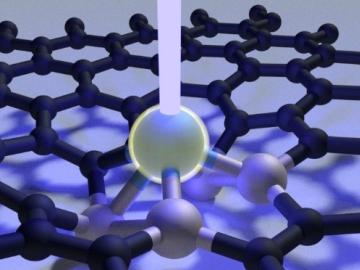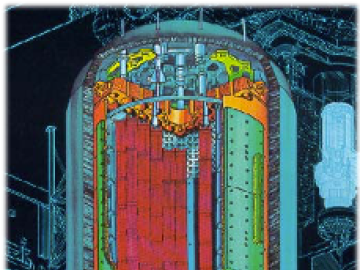
Filter News
Area of Research
- Advanced Manufacturing (6)
- Biology and Environment (64)
- Biology and Soft Matter (1)
- Computational Biology (1)
- Computational Engineering (2)
- Computer Science (9)
- Electricity and Smart Grid (3)
- Energy Science (148)
- Functional Materials for Energy (1)
- Fusion and Fission (14)
- Fusion Energy (8)
- Isotope Development and Production (1)
- Isotopes (3)
- Materials (100)
- Materials Characterization (1)
- Materials for Computing (18)
- Materials Under Extremes (1)
- Mathematics (1)
- National Security (26)
- Neutron Science (35)
- Nuclear Science and Technology (14)
- Nuclear Systems Modeling, Simulation and Validation (1)
- Quantum information Science (1)
- Sensors and Controls (1)
- Supercomputing (70)
- Transportation Systems (2)
News Topics
- (-) Advanced Reactors (40)
- (-) Artificial Intelligence (131)
- (-) Clean Water (33)
- (-) Education (5)
- (-) Grid (74)
- (-) Materials Science (158)
- (-) Transportation (103)
- 3-D Printing/Advanced Manufacturing (146)
- Big Data (79)
- Bioenergy (112)
- Biology (128)
- Biomedical (73)
- Biotechnology (39)
- Buildings (74)
- Chemical Sciences (86)
- Composites (35)
- Computer Science (226)
- Coronavirus (48)
- Critical Materials (29)
- Cybersecurity (35)
- Element Discovery (1)
- Emergency (4)
- Energy Storage (114)
- Environment (218)
- Exascale Computing (67)
- Fossil Energy (8)
- Frontier (64)
- Fusion (66)
- High-Performance Computing (130)
- Hydropower (12)
- Irradiation (3)
- Isotopes (62)
- ITER (9)
- Machine Learning (68)
- Materials (157)
- Mathematics (12)
- Mercury (12)
- Microelectronics (4)
- Microscopy (56)
- Molten Salt (10)
- Nanotechnology (64)
- National Security (86)
- Neutron Science (171)
- Nuclear Energy (122)
- Partnerships (68)
- Physics (69)
- Polymers (35)
- Quantum Computing (53)
- Quantum Science (92)
- Security (31)
- Simulation (65)
- Software (1)
- Space Exploration (26)
- Statistics (4)
- Summit (71)
Media Contacts

In the race to identify solutions to the COVID-19 pandemic, researchers at the Department of Energy’s Oak Ridge National Laboratory are joining the fight by applying expertise in computational science, advanced manufacturing, data science and neutron science.

Sometimes conducting big science means discovering a species not much larger than a grain of sand.

Scientists at Oak Ridge National Laboratory used a focused beam of electrons to stitch platinum-silicon molecules into graphene, marking the first deliberate insertion of artificial molecules into a graphene host matrix.

A software package, 10 years in the making, that can predict the behavior of nuclear reactors’ cores with stunning accuracy has been licensed commercially for the first time.

OAK RIDGE, Tenn., Feb. 27, 2020 — Researchers at Oak Ridge National Laboratory and the University of Tennessee achieved a rare look at the inner workings of polymer self-assembly at an oil-water interface to advance materials for neuromorphic computing and bio-inspired technologies.

We have a data problem. Humanity is now generating more data than it can handle; more sensors, smartphones, and devices of all types are coming online every day and contributing to the ever-growing global dataset.

Each year, approximately 6 billion gallons of fuel are wasted as vehicles wait at stop lights or sit in dense traffic with engines idling, according to US Department of Energy estimates.

OAK RIDGE, Tenn., Feb. 12, 2020 -- Michael Brady, a researcher at the Department of Energy’s Oak Ridge National Laboratory, has been named fellow of the National Association of Corrosion Engineers, or NACE International.

As the second-leading cause of death in the United States, cancer is a public health crisis that afflicts nearly one in two people during their lifetime.
A team of scientists led by Oak Ridge National Laboratory found that while all regions of the country can expect an earlier start to the growing season as temperatures rise, the trend is likely to become more variable year-over-year in hotter regions.


